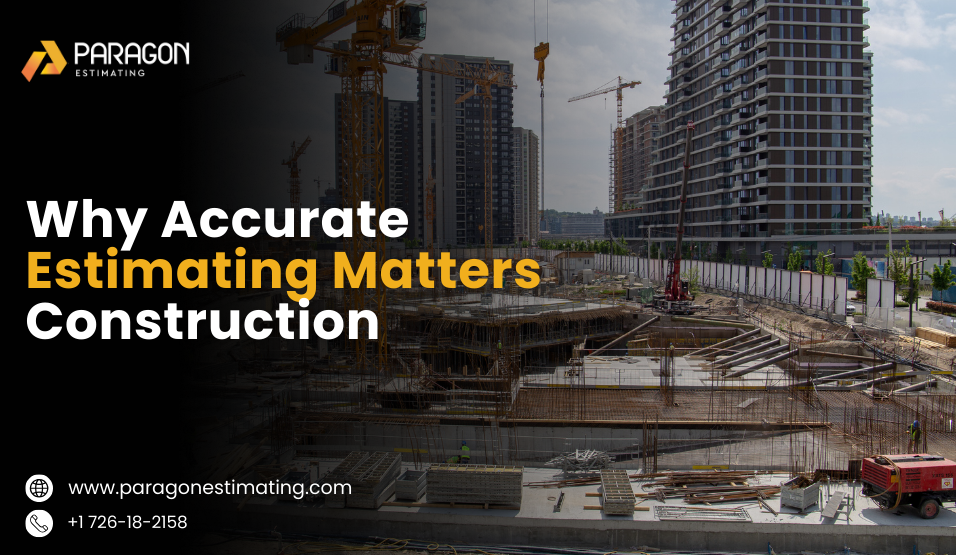Why Accurate Estimating Matters in Construction
Imagine this scenario: you’ve chosen to build your dream home or embark on a commercial construction venture. There’s a lot of excitement; however, so are the questions. What will it cost? Do I have the money to pay for it? What does the final cost look like? This is where the cost of construction estimation comes into play. Here at Paragon Estimating, we understand how important it is for project owners, contractors, and developers to have accurate cost projections before starting construction.
However, many different estimates are not identical, and understanding the difference between a preliminary estimate and more thorough cost estimates can help you avoid unpleasant surprises in the future. In this article, we will explain everything you need to know about these two essential estimation stages, including their purposes, distinct features, and the reasons why they are vital for the success of a construction project.

What is a preliminary estimate?
The preliminary estimate, also called an estimate preliminarily or a quote, is a preliminary cost estimate that is prepared prior to the project’s specifications and plans being finalized. It’s a rough cost estimation intended to give the stakeholders an idea of how much the project could cost based on the limited information available. The use of preliminary estimates is typically for
- Study of feasibility
- Budget creation
- Financial decision-making
- Comparisons of projects
Currently, the estimations rely on general project descriptions, historical data, and unit rates to generate cost estimates.
Importance of Preliminary Estimating
Although it’s not the final term for the project’s cost, an estimate is a vital base for
- The process of determining if a plan is financially feasible
- Approving a funding application.
- The process of initiating design and development
It assists owners in answering the question, “Is this worth pursuing?”
What is a detailed estimate?
Once you complete the plans and specifications, it’s time to create an accurate cost estimate. It’s a complete review of each item in the expenses associated with your construction work.
A detailed estimate includes:
- Costs of labor
- Material cost
- Costs for equipment
- Subcontractor charges
- Profit margins and overheads
It’s usually written just before tendering or contract closing to ensure accurate, reliable financial forecasting.
Benefits of a Detailed Estimate
A detailed estimate:
- Minimize cost overruns.
- Helps with accurate budgeting
- Provides clear breakdowns for decision-making
- It serves as the foundation for both agreements and contracts.
This estimation is crucial for both the client and the contractor to ensure they understand the financial implications of the work.
Differences Between Preliminary and Detailed Estimates
Let’s look at the differences between the preliminary estimate and the elaborate estimate in a simple, straightforward comparison:
Aspect
- Preliminary Estimate
- Detailed Estimate
- Stage of Preparation
The initial stages of the project (conceptual and schematic design phases) include the drawings, designs, and specifications.
Purpose
Budgeting, feasibility analysis, and funding decisions. The process includes tendering, financial planning, accurate forecasting, and contract negotiation.
Accuracy Level
Low (+-20% to +-30%)
High (+-5% to +-10%)
Data Requirement
General information about the project, Historical information, and the unit. The project includes specification-based drawings, detailed drawings, materials lists, and labor costs.
How Are Preliminary Estimates Prepared?
The preliminary estimation process involves
- Reviewing project descriptions
- Reviewing similar past projects
- Calculating costs per unit (e.g., by square foot)
- The process involves the utilization of approximate amounts and allowances.
Typically, you present these estimates as a lump sum or as a breakdown of the important construction systems.
Example: If you’re building an area of two-story feet, a rough estimate could be as simple as multiplying the cost per square foot. ($150–$200) With the area to get an initial figure.
How Are Detailed Estimates Prepared?
An accurate cost estimate demands an extremely precise process:
- Examining the complete engineering and architectural plans
- Doing quantity takeoffs on every construction component
- We utilize accurate rates for material, labor, and equipment costs.
- This includes accounting for overhead costs, profit margins, and potential contingencies.
Example: For the identical 22,000-square-foot home, a comprehensive estimate would determine the exact amount for things like bricks, cement, electrical fittings, and wood, as well as labor hours and equipment rental, and then combine those individual expenses.
When Should You Use Each Estimate?
Make a rough estimate beforehand.
- You must decide whether a particular project is worthwhile to pursue.
- You should look for the first investor or seek financing approval.
- Examining different project options
When to Use a Detailed Estimate
Make a precise estimate when:
- Budgeting and preparing for the project
- Preparing bid documents
- Controlling the construction costs
- Contract negotiations
Common Mistakes to Avoid in Construction Estimating
When you are creating a preliminary estimate or a more detailed estimate, you must avoid these common pitfalls:
- Relying on inaccessible or outdated information
- Not paying attention to local market conditions
- Inattention to site-specific issues
- Inadequately including contingency provisions
- The rush of taking off in quantity
Professional services for cost estimating, such as Paragon Estimating, help you sidestep these costly mistakes.
Why Choose Paragon Estimating for Your Project?
We are Paragon Estimating; we specialize in preliminary estimating as well as precise estimation for commercial, residential, and industrial projects throughout the USA. Our highly experienced estimators employ advanced software and the most current market data to give precise, reliable cost estimates that are tailored to the specific needs of your project.
Our services include:
- Cost estimates for preliminary cost estimations
- Detailed quantity takeoffs
- Cost planning and budgeting
- Studies on feasibility
- Assistance in preparing a bid
Please explore further details about the construction estimating process here.

Know the Difference to Build Smart
In the construction industry, understanding the distinction between a preliminary estimate and a detailed estimate enables you to make more informed and confident financial decisions.
A preliminary estimate establishes the context by offering an initial cost estimate. An exact estimate is the financial plan that ensures your project is within budget and on time. Do you need a solid estimate for the next job you’re working on? Contact Paragon Estimating today for a complimentary consultation, and allow us to help turn your dream into an affordable reality.
FAQs
What is the primary objective of an initial estimate?
An initial estimate can help determine if a project is financially viable and is worth the effort before making a commitment to the specific design and planning costs.
How precise is a preliminary estimation?
Typically, a rough estimate is accurate between ±20% and +30%, since it is based on a limited amount of information.
The importance of this is why a precise estimate is necessary.
A thorough estimate provides precise and detailed cost projections, including itemized costs, which minimize the risk of financial loss, facilitate accurate budgeting, and simplify contract negotiations.
Can a preliminary estimate be changed?
Yes. Estimates from the preliminary stage are refined to more precise estimates as the project’s design changes and more information becomes available, ensuring greater accuracy.
Who is responsible for preparing these estimates?
Cost estimators who are professionals, quantity surveyors, and construction experts, such as Paragon Estimating, prepare both preliminary and more detailed estimates.


